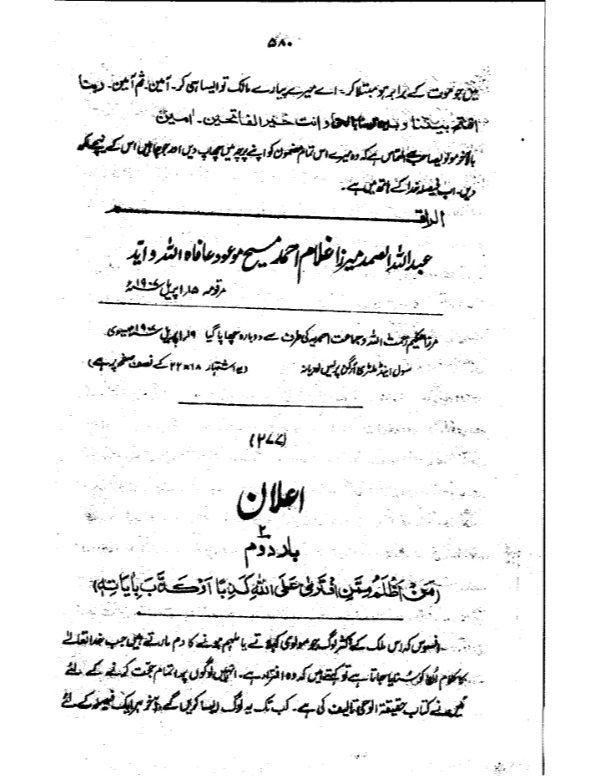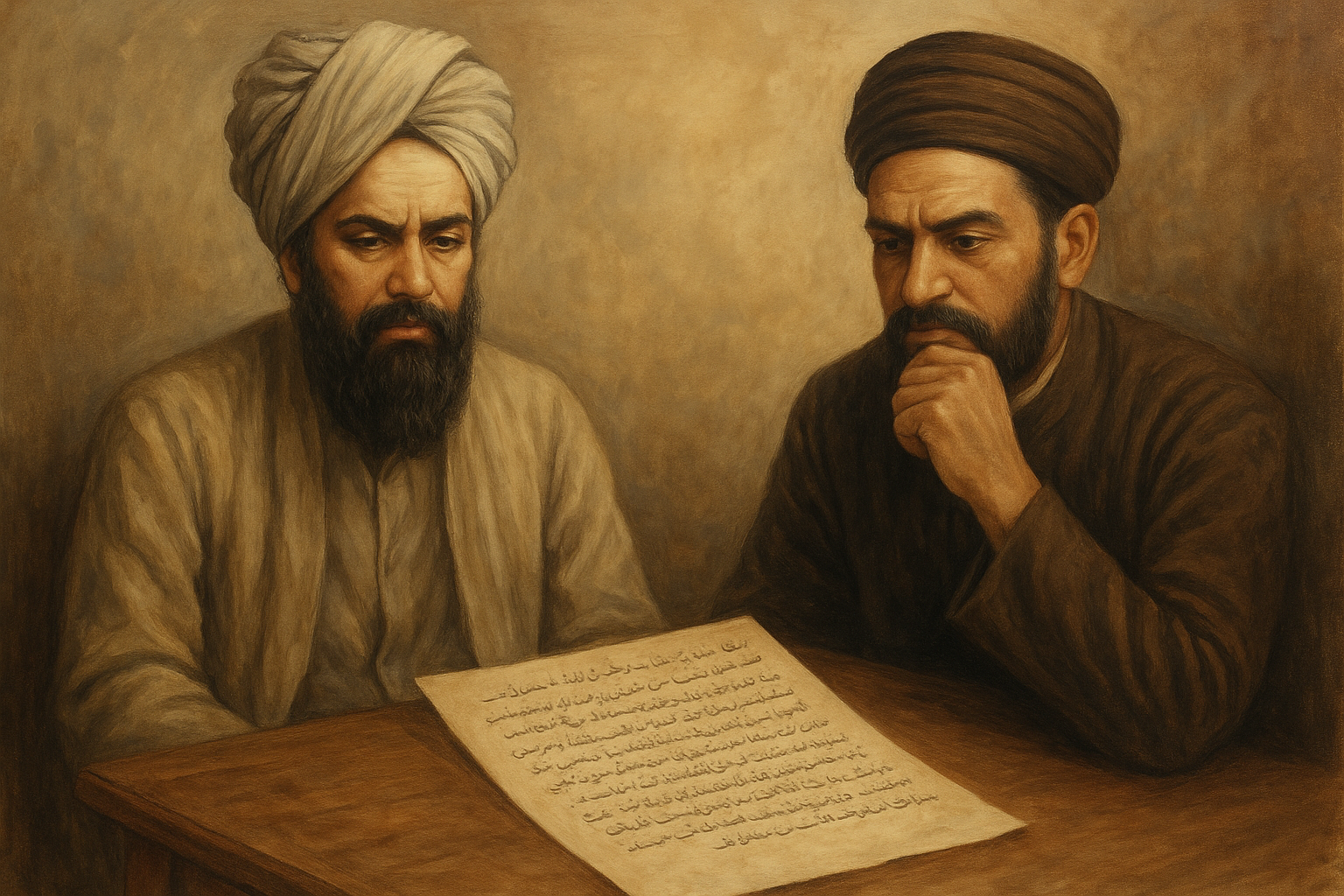Summary
The dispute between Mirza Ghulam Ahmad and Maulvi Sanaullah Amritsari regarding the mubahala is discussed in the linked article from the Ahmadiyya Jama’at perspective.
Mubahala with Maulvi Sanaullah Amritsari (alislam.org)
Key points to consider:
- Both parties failed to reach an agreement on the conditions of the Mubahala.
- The “Akhri Faisla” letter transcended the Mubahala, transforming into a prayer to God.
- Mirza Ghulam Ahmad prayed for the demise of the liar through afflictions like cholera or plague or something similar.
- Mirza Ghulam Ahmad’s death corresponds to the prayer’s description, occurring within the lifetime of Maulvi Sanaullah.
In the letter Mirza Ghulam Ahmad writes:
“If, however, I am not a liar and a rogue, but instead honored by God’s discourse as the Promised Messiah, then I trust that, by the Grace of God, according to the divine practice, you shall not escape the punishment reserved for liars. Therefore, I assert that if, during my lifetime, you do not experience divine retribution beyond human agency, such as fatal diseases like plague or cholera, then I am not from God Almighty. This declaration is not a prophecy based on revelation; instead, it is a supplication seeking a verdict from God Almighty.?
Mirza Ghulam Ahmad concluded the letter with the following words (full text is available at the bottom):
I perceive that Maulvee Sanaaullaah, through these false allegations, seeks to dismantle the organization of the Ahmadiyya Movement—a structure established by Your hands, O my Lord and the One who sent me. Therefore, I implore You, clinging to Your Holiness and Mercy: Deliver a true verdict between me and Sanaaullaah, making the mischief-monger and liar depart from this world during the lifetime of the truthful one. Alternatively, afflict him with a severe tribulation equivalent to death. O my beloved Master, act according to this supplication. Aameen and once again Aameen.
[Arabic text of a portion of the verse Quran 7:90: “O our Lord, decide Thou between us and between our people with truth and Thou art the Best of those who decide.”]
In conclusion, I request Maulvee Saahib to publish this entire article in his periodical and express whatever views he deems fit. Now the decision lies in God’s hands.
The writer: Servant of Allah, The Eternal — Mirza Ghulam Ahmad, the Promised Messiah. May God protect him and help him.
The statements above are clear and would be easily understood by an impartial reader. It is reasonable to infer that these words reflect a sincere prayer to God by Mirza Ghulam Ahmad, seeking divine validation for the truth (or lack thereof).
Thought-provoking Queries
- Can someone claiming to be a Prophet still hold that title if their direct prayers to God for a specific sign, as a truth-test, go unanswered? Prophets are expected to have a line of communication with God; even if the prayer isn’t fulfilled, should there not be divine communication explaining why? Why did Allah remain silent in this instance?
- Contemplating the hypothetical scenario where Maulvi Sanaullah had died during Mirza Ghulam Ahmad’s lifetime raises intriguing questions. What would Mirza Ghulam Ahmad have conveyed? How would the Jama’at interpret it today? Considering the binary nature of the prayer to God, is it fair not to view it as unsuccessful if the desired outcome did not materialize?
- The precision of the prayer raises intriguing reflections. Is it not significant that Mirza Ghulam Ahmad uttered the words “I have Cholera” on his deathbed, aligning with the specific affliction mentioned in the prayer?
Mirza Ghulam Ahmad’s death
It is crucial to note that the circumstances surrounding a person’s death should not be unduly emphasized, as this is ultimately within God’s control. However, Mirza Ghulam Ahmad himself elevated the significance of these circumstances through his writings. The details of his death are outlined below:
In essence, Mirza Ghulam Ahmad experienced severe diarrhea just before his demise, reaching a point where he had to relieve himself next to his bed and subsequently lost consciousness. This incident is documented in the book “Seerat-ul-Mahdi,” authored by his own son, Mirza Bashir Ahmad MA, and published by the Ahmadiyya Jama’at.
Furthermore, in another publication, “Hayat-e-Nasir,” authored by Mir Nasir Nawab and also published by the Ahmadiyya Jama’at, Mirza Ghulam Ahmad is reported to have said, “Mir Sahib, I have Cholera.”
References to both of these accounts are provided below.
References to Mirza Ghulam Ahmad’s death
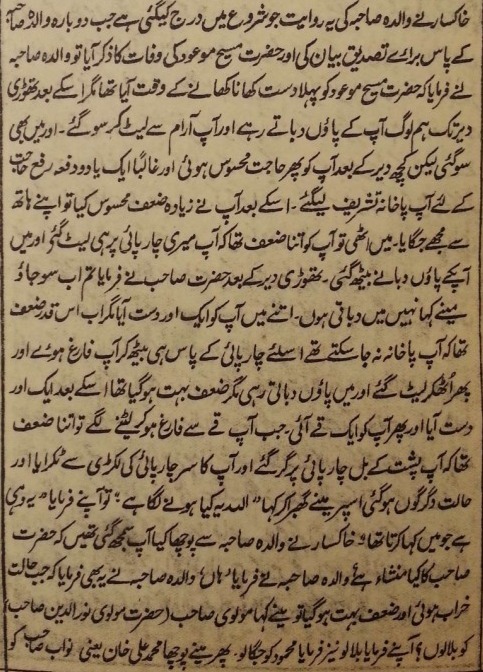
[1923 seeratul mahdi vol Page 15 in pdf]

[Hayat e Nasir Page 20 in pdf]
Ahmadiyya Jama’at’s Argument
Defense 1: Ahmadiyya Jama’at contends that the encounter with Maulvi Sanaullah Amritsari was a Mubahala, and Maulvee Sanaaullaah was evidently reluctant to engage in such a challenge.
Response: Contrary to this, the “Akhri Faisla” letter is not merely a Mubahala challenge but a sincere prayer for a “Final Decision” from God to discern the truthful from the liar.
Defense 2: Ahmadiyya Jama’at asserts that Mirza Ghulam Ahmad did not succumb to cholera; rather, his last words were a prayer, “Oh God, my beloved God.” Furthermore, the community regards death from abdominal diseases as a form of martyrdom. More details on this perspective can be found in the article Did Hazrat Mirza Ghulam Ahmad die an objectionable death?.
Response: Regardless of the specific cause of his death, it’s crucial to note that the prophecy’s conditions were not limited to a particular ailment. Mirza Ghulam Ahmad’s reference to cholera on his deathbed aligns with the broader conditions of his curse on Maulvi Sanaullah. The claim about Mirza Ghulam Ahmad’s last words may hold true, but it remains inconsequential to the ultimate outcome of the prayer. Ahmadiyya Jama’at does not dispute that Mirza Ghulam Ahmad expressed his apprehension about cholera before his demise.
Defense 3: Maulvi Sanaullah’s demise occurred in relative obscurity, with his family facing tragedy during the 1947 riots.
Response: Conversely, one could argue that Maulvi Sanaullah’s truthfulness is attested by God, and his memory lives on among Muslims. The adversity faced by his family during the migration to Pakistan could be seen as martyrdom in a Muslim country.
Defense 4: Maulvi Sanaullah countered the Akhri Faisla letter by suggesting that God grants the liar a “long rope,” signifying an extended life. He drew parallels to the cases of Musailima Kazzab and Prophet Muhammad (Saw). Consequently, Maulvi Sanaullah outliving Mirza Ghulam Ahmad is presented as the fulfillment of this prophecy. This argument was consistently reiterated by Mirza Tahir Ahmad.
Response: This position raises two critical concerns:
- It implies the superiority of the opponent’s prayer over the supplication of a “True Prophet.”
- The argument eliminates the potential for the prophecy’s failure, allowing the Ahmadiyya Jama’at to claim victory in either outcome. (Texas Sharpshooter Fallacy)
Conclusion
The reader is left to form their own judgment. One perspective suggests the prophecy’s fulfillment, as the purported liar passed away within the lifetime of the alleged truthful person, aligning with the specified conditions in the prophecy.
The Final Verdict with Mr. Maulvi Sanaullah (Amritsari) - Full Text
In the Name of Allah, the Most Beneficent, the Ever Merciful
Submitted to Mr. Maulvi Sanaullah. Peace be upon whosoever follows the guidance. For a long time, your publication Ahl-e-Hadeeth has continuously accused me of falsehood and misguidance. You have repeatedly referred to me as a liar and a deceiver in your magazine, associating my name with derogatory titles.
If indeed I am the liar and deceiver as you claim, then I declare that I will die during your lifetime, for I know that the life of a liar and a corrupt person is often short, and they meet their end in disgrace during the life of their opponents. It is better for such a person to die so that they do not mislead the servants of God.
However, if I am truthful and honored by God’s communication as the Promised Messiah, then by the grace of God, according to His established practice, you will not escape divine punishment for falsely accusing me. Therefore, I state that if during my lifetime, you do not face divine punishment beyond human intervention—such as fatal diseases like the plague, cholera, etc.—then I am not from God.
This is not a prophecy revealed by divine inspiration, but rather a prayer seeking God’s judgment.
I beseech God, the All-Knowing, the All-Aware, and the All-Powerful, who knows the condition of my heart: O my beloved Master, if my claim of being the Promised Messiah is a lie, and in Your eyes, I am indeed a corrupt person and a liar, constantly engaged in deceit, then I humbly pray that I die in the lifetime of Maulvi Sanaullah, bringing joy to him and his followers by my death. Ameen.
However, O my Perfect and True God, if Maulvi Sanaullah’s accusations against me are false, I humbly pray to You that he meets his end in my lifetime, not by human hands, but through fatal diseases like the plague, cholera, etc.—unless he openly repents before me and my community, retracting his false accusations and vile language that he habitually uses against me. Ameen, O Lord of all the worlds. Ameen.
I have suffered much from his false allegations and endured it with patience. However, I see that his slander and insults have crossed all limits. He considers me worse than thieves and robbers who cause great harm to the world. He has falsely spread this slander about me to distant lands, claiming that I am a mischief-maker, a fraud, and a liar.
If such slanderous words did not affect sincere seekers of truth, I would have remained patient. However, I see that Maulvi Sanaullah is using these false accusations to destroy the movement that You, O my Lord, established with Your own hands. Therefore, I now turn to You, clinging to Your Holiness and Mercy, and I pray that You grant a true verdict between me and Maulvi Sanaullah, making the one who is indeed corrupt and a liar depart from this world during the lifetime of the truthful one, or afflict him with a severe calamity equivalent to death.
O my beloved Master, I beseech You to act in accordance with this prayer. Ameen, and once again, Ameen.
Arabic verse from the Quran: “Our Lord, decide between us and our people in truth, for You are the best of those who decide” (Quran 7:89).
In conclusion, I request Maulvi Sahib to publish this entire letter in his magazine and write whatever he deems appropriate below it. Now, the decision lies in the hands of God.
The writer: Servant of Allah, the Eternal — Mirza Ghulam Ahmad, the Promised Messiah. May God protect and support him.
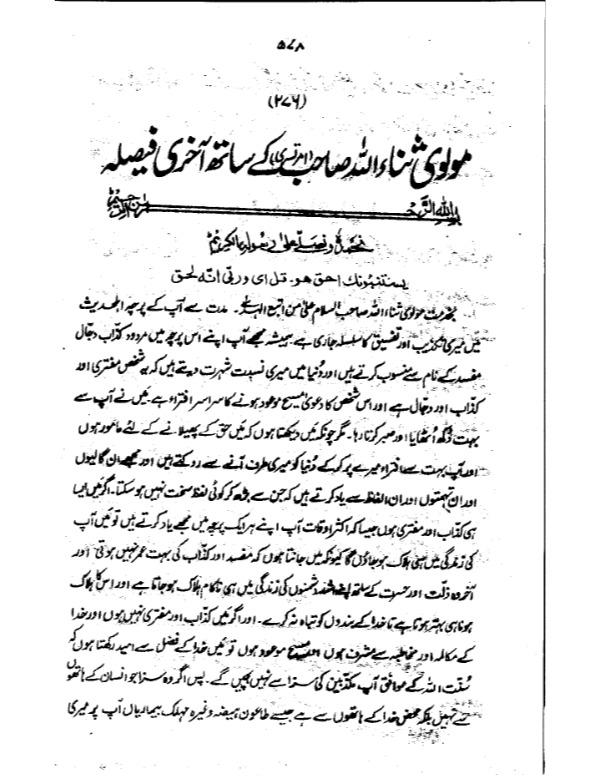
[ishtaharat v3 Page 582 in pdf]
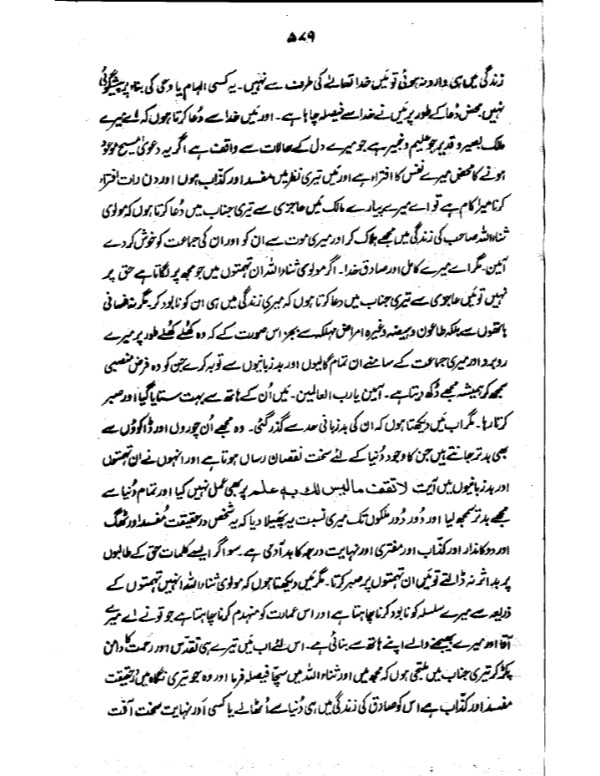
[ishtaharat v3 Page 583 in pdf]
